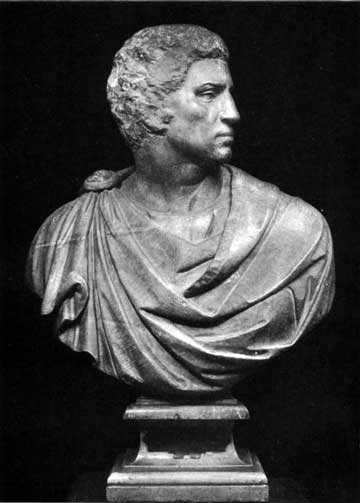Play (1599)
by William Shakespeare
Directed by Olivia D’Ambrosio
Bridge Repertory Theater of Boston
Boston Center for the Arts, South End, Boston
May 9 – 30, 2015
Esme Allen: Scenic Design; Stephen Petrilli: Lighting Design; Stephanie Brownell: Costume Design; Jackie Kempe: Properties Design; Shura Baryshnikov: Movement
With Joe Short (Brutus), John Tracey (Cassius), Brooks Reeves (Julius Caesar), Tiffany Nicole Greene (Mark Antony), Kate Paulsen (Portia), Bridgette Hayes (Calpurnia), Bari Robinson (Casca), Juan C. rodriguez (Decius), Jacob Athayal (Cinna), Will Madden (Lucius), Anneke Reich (Soothsayer), Lindsay Eagle (Soothsayer)

Collezioni d’Arte e di Storia della Fondazione Carisbo, Bologna
Caught in the travails of my own city and stuck in the tunnels of the Red Line for a good chunk of an hour, I arrived ten minutes late at the Bridge Rep’s take on the great Shakespearean take on a Roman civic tragedy, and so I offer my impressions qualified by that unintended pre-abridgment. Graciously, moreover, Bridge Rep artistic director and director of the current production, Olivia d’Ambrosio, welcomed me to the final preview of the show which was scheduled to officially open a day later.
The Bridge Rep is a great, energetic, young theater that has offered a whole range of things during its first two years in Boston. Its experiments are wide and its probings and escapades are interesting and varied. D’Ambrosio, an experienced actress and director who here is directing Shakespeare for the first time, offers a bold experiment, portending much for further explorations, and suggestive, in its own right, of the distilled core of Shakespeare’s potent tragedy.
A signal feature of he current production is its brevity. Cut back from its original multiple-hour format (at least two and a half), this production is given in one hundred minutes without intermission. Though it is an intense hour and a half and offers something unique in its unpaused intensity, it also feels like a bit too much packed into a short space. I wondered how Hamlet given in a hundred minutes might feel which made me think about what such condensation in the current production entailed.
Cassius (John Tracey) earnestly seduces Brutus (Joe Short) into the dastardly act, and the associated gang of senators murmur, then rapidly turn their murmurings to violent culmination, and it all happens very quickly. Significantly, Brutus, barely has time to muse and meander, his distinguishing sign of nobility being an elevated confusion that resistantly results in the violent conspiracy that follows.
The tragic hero of the play, Brutus can only succeed in creating its moral center when he delivers a clear enough sense of confusion to enable the adroit swaying of his noble temper by the insidious Cassius to have its effect. Here, there is not enough time in which to get that sense of confusion, or the moral percolation towards the strange and potent brew that develops from it. It is as though one were watching that percolation occur in sped up stop-action photography.

Museo Nazionale del Bargello, Florence
Music, atonal and unsettling, is beautifully and hauntingly rendered by the two soothsayers and choral supports, Anneke Reich and Lindsay Eagle.
The soothsayers also give narrative introductions, leading the audience through the rapidly unfolding scene changes. Shakespeare never does this, but, in foreshortened form without the advantage of vivid scene changes, such directives may have seemed necessary; it’s a nonstandard embellishment and somewhat strange to poke these short guideposts into the Shakespearean verbal landscape.
The set by Esme Allen is a wild construct of chairs and desks, piled up, mashed together, giving a great sense of confusion, anarchy and wildness. It’s a wonderfully tempestuous construction, clearly an evocation of the upending of order, as though the classroom of life had been torn asunder and everything for which one had assumed a seat or place of rest had now been thrown to the winds.
The youthful troupe of actors is forceful and relentlessly intense.
Tracey’s Cassius has a seething callousness, vituperative in its constancy and resolve. What simmers on the stove in longer productions rises immediately to a full boil here, the demonic quality standing out almost from the beginning, a little too hot too soon.
Short’s Brutus is, in the time allotted, confused and deliberative enough to give a suggestion of nobly hanging in the balance, but swept up in the fray before that nobility gets to radiate.
Though her role is relatively small, Kate Paulsen’s Portia has an effectively penetrating presence, rendered with a clarity of delivery that is particular effective.
A conceit of this adaptation is to not only have Mark Antony portrayed by a woman, but to change the text so that he is now referred to as she. I’m not sure that hits home, given the nature of the Roman business involved. Tiffany Nicole Greene is fine in the role, but the fraternal fidelity between Caesar and Antony gets lost in the shuffle with this transsexual update. Portraying Antony as a woman without changing the text would have been an interesting alteration without as much readjustment of expectations.
– BADMan
Leave a Reply